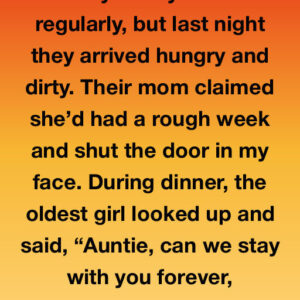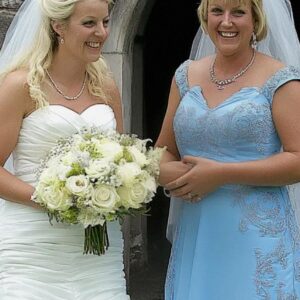
He never wanted a party—just quiet in the garden and a slice of chocolate cake. But this year, as I lit the candles for ninety-six, his hands trembled. “I shouldn’t be the one here,” he whispered.
I asked why. He looked straight at me and said, “Because you were supposed to.”
At first, I thought maybe his age was getting the better of him. His mind had stayed sharper than most, but every now and then, he’d slip into memories that didn’t quite line up with reality.
Still, the way he said it—so firm, so certain—stopped me. I blew out the match I was holding and sat down across from him. “What do you mean?” I asked softly.
His eyes watered as he looked at me. “It should have been you,” he repeated, slower this time. “That night… I never told anyone.”
I froze.
My grandfather had lived through wars, hardship, and the kind of life that shapes people into steel. He rarely spoke of the past, except in bits and pieces that sounded almost rehearsed. But something about his tone told me this wasn’t one of those practiced stories.
This was something raw, something buried. He reached for the cake but didn’t touch it. His hands just hovered over the candles, the flames flickering against his wrinkled skin.
“When I was young,” he began, “there was a fire. You know that much, don’t you?”
I nodded. I had heard fragments over the years—that when he was about twenty, there had been a fire at the mill where he worked.
But it was always told like a passing detail, nothing more. He had survived. That was all.
“Everyone remembers it differently,” he continued. “Some say I saved a man. Others say I was lucky.
But the truth… the truth is harder to tell.” He paused, swallowing hard. “I wasn’t supposed to leave that building. I traded places.”
I leaned forward, my heart thudding.
“Traded places with who?”
He looked at me then, his eyes steady despite the tremor in his hands. “With your great-uncle. My brother.”
The words hit me like a brick.
Growing up, I knew he had a brother who had died young, but the story was vague. A fire, an accident—that was all anyone ever said. No one explained much, and I never pushed.
Now, for the first time, the silence cracked open. “We were both inside when the flames spread,” he said quietly. “The floor was already collapsing.
There was only one way out. He pushed me forward, but I… I pushed back. I told him he had a wife waiting, a baby on the way.
I told him I couldn’t take his place.” His voice broke then, something I had never heard before. “But he refused. He said I was meant to live longer.
He shoved me through that door and locked it behind me.”
I sat there stunned, the candles burning lower between us. “So when you said it should have been you—”
“Yes.” His voice was barely a whisper now. “Every year I’ve carried it.
Every year I’ve thought, ‘It should have been me.’ And today, when you lit those candles, I thought again of the man who should be here instead of me.”
The cake sat untouched. My hands shook as I reached for his. “Grandpa, you didn’t choose it.
He did. He made that choice for you.”
But I could see in his eyes that he had never accepted that truth. Ninety-six years, and the guilt still clung to him.
That night, after he went to bed, I couldn’t stop thinking about it. I went digging through old family boxes, searching for anything about my great-uncle. I found a photograph of him, a man with the same sharp jawline as my grandfather, standing proudly in front of the mill.
I found a yellowed newspaper clipping about the fire, praising the “bravery” of workers who had tried to save others. But nowhere did it mention my great-uncle by name. The next morning, I brought the photo to my grandfather.
He stared at it for a long time, tears sliding silently down his cheeks. “That’s him,” he said. “The better man.”
“Don’t say that,” I told him.
“He chose to give you life. Maybe he saw something in you that you couldn’t see in yourself.”
But he shook his head, as stubborn as always. “I wasted it.
I never became anyone special. He should have lived.”
I couldn’t accept that. My grandfather wasn’t perfect, but he had raised a family, worked hard his whole life, and showed kindness to everyone who crossed his path.
That wasn’t nothing. Still, I knew words weren’t enough. He needed something tangible, something that would ease the weight he had carried for nearly a century.
So I came up with an idea. I called Laura, a cousin I barely kept in touch with, and explained everything. Together, we reached out to others in the family, piecing together stories about my great-uncle.
Old letters, memories, bits of history—all the fragments we could find. Slowly, we built a picture of his life, not just how it ended but who he had been. Two weeks later, we gathered in the garden again, but this time, it wasn’t for my grandfather’s birthday.
We surprised him with what looked like a small ceremony. At first, he was confused, even a little resistant. But when I handed him a framed collage of his brother’s photo surrounded by handwritten notes from the family, something shifted in his eyes.
“This is for him,” I said softly. “We can’t change what happened, but we can honor him. And maybe that’s what he wanted—for his sacrifice to mean something.”
For the first time in years, I saw my grandfather smile in a way that wasn’t tinged with guilt.
It was small, almost fragile, but it was there. Still, the story didn’t end there. A few days later, I got a call from a woman named Margaret, who claimed to be the granddaughter of a man who had also worked at the mill.
She said she had read about our little family gathering on a local community page where someone had shared photos. She wanted to meet us. Curious, I agreed.
When she arrived, she brought a box of her own. Inside were letters her grandfather had written about that night of the fire. One of them mentioned my great-uncle by name.
“He was the bravest of us all,” it read. “He gave his brother a chance at life, and we all knew it. None of us would forget.”
When I showed that letter to my grandfather, he cried harder than I had ever seen.
But this time, the tears weren’t only of sorrow—they carried relief too. Someone else had remembered. Someone else had witnessed his brother’s sacrifice.
It wasn’t just his burden to carry anymore. From that moment, he changed. He still had his quiet days, still asked for nothing more than his garden and his cake.
But when people came to visit, he began telling the story—not with shame, but with reverence. He spoke of his brother as the hero he truly was, making sure his memory would live on. On his ninety-seventh birthday, when I lit the candles again, his hands still trembled.
But this time, he didn’t whisper about who should or shouldn’t be there. Instead, he said, “I’ve had enough life for the both of us. And I hope I’ve lived it well enough to honor him.”
We all raised our glasses, and for once, I felt like he finally believed it.
The twist of it all was that the guilt he carried had almost blinded him to the truth—that his life had been full of meaning, not because of what he achieved, but because of the kindness and love he poured into everyone around him. And maybe, in some way, that was exactly what his brother had seen in him all those years ago. As I look back now, I realize the lesson he left us with.
Sometimes we carry burdens that aren’t really ours to bear, punishing ourselves for choices we didn’t make. But love, in its purest form, means giving and receiving without tallying who deserved what. My great-uncle gave my grandfather life, and my grandfather gave us all the gift of his presence.
That night, as I cleaned up the dishes, I tucked that handwritten collage back onto the shelf where my grandfather could see it every day. And I thought about how one man’s sacrifice had rippled across generations, shaping who we are and reminding us of the power of love. So if you’ve ever carried guilt for surviving, or for being the one still here, remember this: sometimes the best way to honor those who couldn’t stay is simply to live fully and kindly in their place.
And if this story touched you, share it with someone who needs reminding that compassion, even in the hardest moments, leaves a legacy that time cannot erase.





